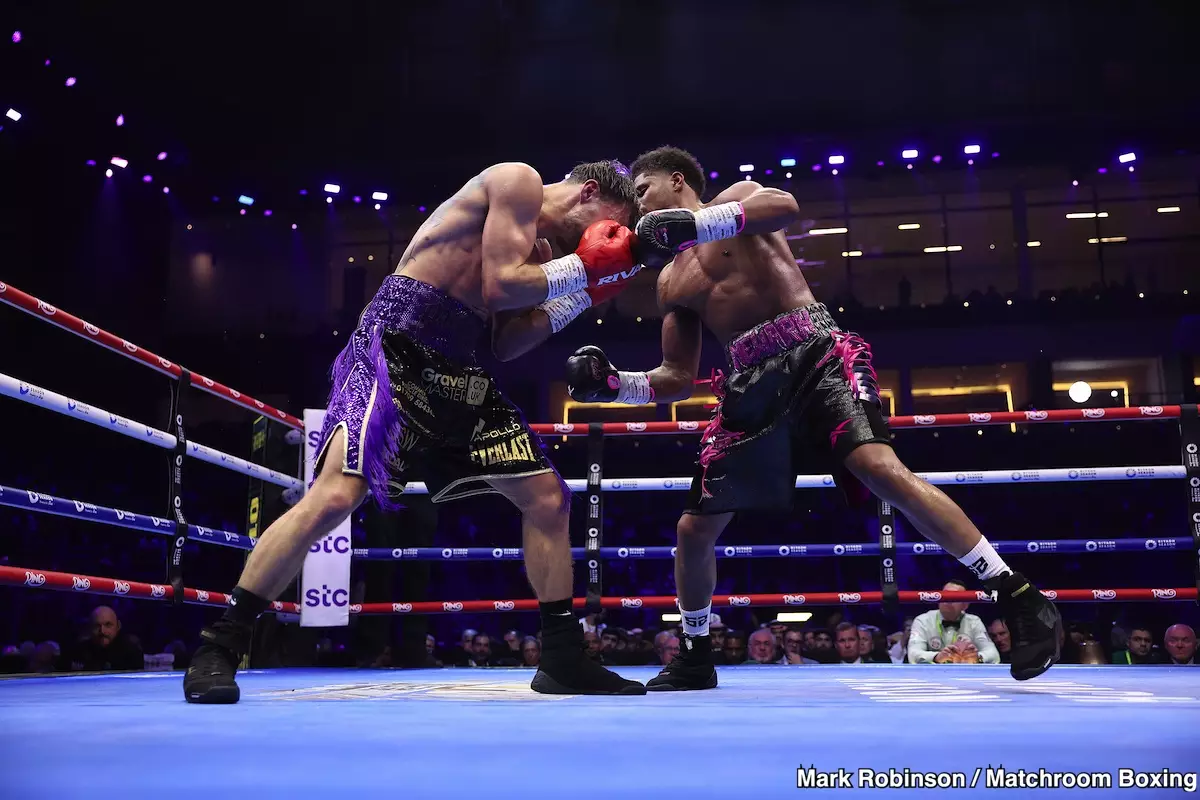Shakur Stevenson detailed his recent title defense with a mix of pride and nonchalance, stating to reporters that he “barely got touched” this past Saturday night. The confident champion secured a ninth-round technical knockout against Josh Padley, a fighter who arguably faced his toughest challenge yet. Despite his impressive record of 23-0 with 11 KOs, the performance unmasked significant issues related to the nature of his competition and the potential stagnation in his career trajectory.
While a victory by TKO inherently reflects a dominant performance, it is crucial to scrutinize the quality of the opponent. Padley, who held limited exposure to elite fighters, came into the bout boasting only a singular notable opponent, Mark Chamberlain. In facing Stevenson, Padley’s step up from British-level competition illuminated the vast gap between him and more seasoned challengers, revealing that Stevenson’s apparent dominance was contingent upon a lack of experience from his adversary. This mismatch raises valid concerns about the effectiveness of his training and overall growth as a fighter when up against lower-tier competition.
Stevenson expressed satisfaction with his performance, acknowledging that he could have ended the contest sooner. He remarked on the need for continuous refinement, stating, “As long as I enjoyed what I did, that’s all that matters.” However, a serious contender would have tested his skills more rigorously. The remarks indicate an underlying complacency; while staying active is essential, relying on mundane opponents may hinder the progression of an athlete’s capabilities and market appeal.
There is a pressing need for Stevenson to confront higher-caliber competition if he hopes to solidify his legacy and refine his skills. The call for better matchups is not just a matter of opinion but rather a necessity for any champion aiming to retain legitimacy in the sport. Obligations lie not just with the athlete but also extend to promoters and organizations. In this case, the finger points to figures like Turki Alalshikh, who should facilitate and advocate for more significant bouts.
With four fights since transitioning to the lightweight division in 2023, only one opponent, Edwin De Los Santos, could be considered at a competitive level. The continued selection of fighters like Padley risks reinforcing criticisms that Stevenson has been partially sheltered throughout his eight-year professional career, a notion that could undermine his credibility as a fighter in the eyes of fans and analysts alike.
Stevenson’s frustration is palpable as he recalls the challenges faced in matchmaking, particularly in regard to Floyd Schofield, whom he had initially selected for the title defense. That Schofield withdrew due to illness appears to have struck a chord with Stevenson, leading him to speculate on dishonesty behind the scenes. “He slapped me in the face when he did what he did,” Stevenson asserted, suggesting a personal affront in the wake of preparing for what should have been a more competitive battle.
However, placing blame on others is a misstep. A boxer of Stevenson’s caliber should wield influence over opponent selection and could have sought a more formidable contender. The floating candidacy of Cuban Jadier Herrera exemplifies that. With a record boasting 14 KOs in 16 fights, Herrera presents a legitimate challenge with the potential to elevate Stevenson’s status. The reluctance to face such adversaries does raise concerns about Stevenson’s readiness to embrace risk—an essential element for championship-level fighters.
The trajectory for Stevenson, now 27, will be determined by his choices in the coming months. The ability to secure more competitive fights will significantly impact his legacy and overall career progression. Continuously pitting himself against subpar competition may offer short-term gains but will ultimately attract long-term skepticism regarding his abilities and accomplishments.
As fans digest his latest victory, the scrutiny will intensify. The boxing community is tuned into the reality that untested champions struggle to evolve, and complacency can be a career’s unmaking. Stevenson must navigate the balance between maintaining his title and confronting fierce rivals. The expectations on his shoulders are immense, and how he chooses to respond will shape how he is remembered—a talented boxer with a resume lacking in rigorous challenges or a resilient champion who rose to every occasion.
While Stevenson celebrates his recent victory, it serves more as a reminder of the challenges ahead. Without significant changes in his approach to competition, he risks being a champion regarded more for what could have been than what he actually accomplished.


Leave a Reply